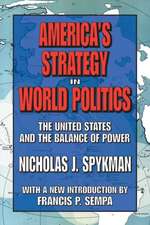Geopolitics: From the Cold War to the 21st Century
Autor Francis Sempaen Limba Engleză Paperback – 30 sep 2007
While mindful of the impact of such concepts as "globalization" and the "information revolution" on our understanding of contemporary events, Sempa emphasizes traditional geopolitical theories in explaining the outcome of the Cold War. He shows that, the struggle between the Western allies and the Soviet empire was unique in its ideological component and nuclear standoff, the Cold War fits into a recurring geopolitical pattern. It can be seen as a consequence of competition between land powers and sea powers, and between a potential Eurasian hegemonic power and a coalition of states opposed to that would-be hegemony.
The collapse of the Soviet empire ended the most recent threat to global stability. Acting as a successor to the British Empire, the United States organized, funded, and led a grand coalition that successfully countered the Soviet quest for domination. No power or alliance posed an immediate threat to the global balance of power. Indeed, the end of the Cold War generated hopes for a "new world order" and predictions that economics would replace geopolitics as the driving force in international politics. Russian instability, the nuclear dimension of the India-Pakistan conflict, and Chinese bids for dominance have turned the Asia-Pacific region into what Mahan called "debatable and debated ground." Russia, Turkey, Iran, India, Pakistan, China, Japan, the Koreas, and the United States all have interests that collide in one or more of the areas of this region.
Preț: 426.51 lei
Nou
Puncte Express: 640
Preț estimativ în valută:
81.61€ • 85.22$ • 67.39£
81.61€ • 85.22$ • 67.39£
Carte tipărită la comandă
Livrare economică 15-29 aprilie
Preluare comenzi: 021 569.72.76
Specificații
ISBN-13: 9781412807265
ISBN-10: 1412807263
Pagini: 134
Dimensiuni: 152 x 229 x 5 mm
Greutate: 0.23 kg
Ediția:1
Editura: Taylor & Francis
Colecția Routledge
Locul publicării:Oxford, United Kingdom
ISBN-10: 1412807263
Pagini: 134
Dimensiuni: 152 x 229 x 5 mm
Greutate: 0.23 kg
Ediția:1
Editura: Taylor & Francis
Colecția Routledge
Locul publicării:Oxford, United Kingdom
Cuprins
1: Geopolitical Perspectives; 1: Introduction; 2: Mackinder’s World; 3: The Geopolitics Man; 4: The First Cold Warrior; 2: Geopolitics from the Cold War to the Twenty-First Century; 5: Geopolitics and American Strategy in the Cold War; 6: The Geopolitics of the Post-Cold War World; 7: Why Teach Geopolitics; 8: Geopolitics in the Twenty-First Century
Descriere
Writers, observers, and practitioners of international politics frequently invoke the term "geopolitics" to describe, explain, or analyze specific foreign policy issues and problems








